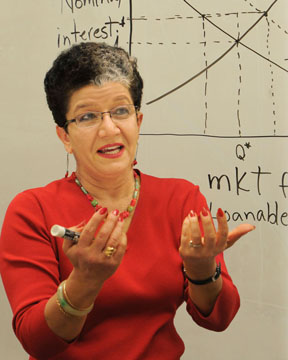Purdue Profiles: Hedayeh Samavati

Hedayeh Samavati, economics professor at Indiana University-Purdue University Fort Wayne. (Photo provided)
Through a macroeconomist's perspective, Hedayeh Samavati, economics professor at Indiana University-Purdue University Fort Wayne, researches crime and other topics to better understand their economic impact and improve the quality of life in Indiana and across the country.
Although the subject is complex, she passes on her enthusiasm for economic progress to her students using real-world examples -- the recession, unemployment and the rising cost of living. Samavati says the prevalence of economic issues in the media has helped her students understand that economic analysis can be applied to many areas of life.
How did you become interested in economics?
I am originally from Iran, and having come from a developing country, I have always been interested in policies that can better everyday life for average men and women. There was a lot of appeal in macroeconomics because it addresses issues pertinent to everyone's well-being -- levels of income, poverty and employment. I was interested in learning about ways in which the standard of living could be increased for everyone. Studying economics is how I have pursued this interest.
In what ways have you been able to help improve to the quality of life in America through your study and research?
An important ingredient in the recipe for long-term economic growth, which results in a higher standard of living, is improvement in education levels. In economists' jargon, acquiring education is called investing in "human capital." My contribution to improving the quality of life in America has to be educating its youth. The research I do has informed and strengthened my teaching. The results of my studies have been cited in other research and thus, ever so slightly, have helped push the boundaries of knowledge, which will ultimately improve everyone's quality of life.
How has your upbringing played a role in your career in academia?
I come from a family of all teachers. My parents, aunts, uncles and one of my sisters are teachers. I believe teaching is in my blood. In eastern cultures, people have the utmost respect for educators. They are held in very high esteem. From childhood, I learned that becoming a teacher was the highest profession to which I could aspire. So I started teaching my brother and sisters when we were little and tutoring my friends in school. I very much enjoy teaching, so to be able to do it at the college level and make my living from it is wonderful.
What research have you done involving crime and economics?
A few years back there was a surge of bank robberies in the Fort Wayne area, so I decided to look at the economics of the situation, not only here but also across the United States. It intrigued me because, as a kid watching movies like "Butch Cassidy and the Sundance Kid," I had thought of bank robbery as a thing of the past, so when it started happening frequently and so close to home, it surprised me.
Using economic and statistical methods, I discovered the determinants of bank robbery as well as variables that can help to predict whether a bank will fall victim to this crime. For example, I found that, as suggested by economic theory, when the unemployment rate goes up, the possibility of obtaining gainful employment goes down, so the costs of seeking money through illegal means -- bank robbery -- decrease, meaning incidences of bank robbery are likely to increase.
What is one thing everyone should know about economics?
To spark my students' interest in economics, I tell them that many world leaders, sports icons and successful actors studied economics. President Reagan, Kofi Annan, Cate Blanchett, John Elway, Arnold Schwarzenegger, Mick Jagger, Bill Belichick, Danny Glover and many others majored in economics.
Besides that fun fact, people should know that economic theory can help us explain and understand issues related to everything from domestic abuse and lifestyle to education and poverty. We all thrive and fall based upon the economy's performance. So having a good understanding of economics can help all of us make better decisions as individuals as well as a citizens whose informed actions lead to better outcomes in a democratic society.
